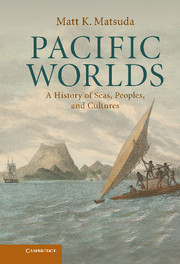Book contents
- Frontmatter
- Contents
- Illustrations
- Maps
- Acknowledgments
- Map
- Introduction: Encircling the ocean
- 1 Civilization without a center
- 2 Trading rings and tidal empires
- 3 Straits, sultans, and treasure fleets
- 4 Conquered colonies and Iberian ambitions
- 5 Island encounters and the Spanish lake
- 6 Sea changes and spice islands
- 7 Samurai, priests, and potentates
- 8 Pirates and raiders of the Eastern seas
- 9 Asia, America, and the age of the galleons
- 10 Navigators of Polynesia and paradise
- 11 Gods and sky piercers
- 12 Extremities of the Great Southern Continent
- 13 The world that Canton made
- 14 Flags, treaties, and gunboats
- 15 Migrations, plantations, and the people trade
- 16 Imperial destinies on foreign shores
- 17 Traditions of engagement and ethnography
- 18 War stories from the Pacific theater
- 19 Prophets and rebels of decolonization
- 20 Critical mass for the earth and ocean
- 21 Specters of memory, agents of development
- 22 Repairing legacies, claiming histories
- Afterword: World Heritage
- Notes
- Index
21 - Specters of memory, agents of development
Published online by Cambridge University Press: 05 June 2012
- Frontmatter
- Contents
- Illustrations
- Maps
- Acknowledgments
- Map
- Introduction: Encircling the ocean
- 1 Civilization without a center
- 2 Trading rings and tidal empires
- 3 Straits, sultans, and treasure fleets
- 4 Conquered colonies and Iberian ambitions
- 5 Island encounters and the Spanish lake
- 6 Sea changes and spice islands
- 7 Samurai, priests, and potentates
- 8 Pirates and raiders of the Eastern seas
- 9 Asia, America, and the age of the galleons
- 10 Navigators of Polynesia and paradise
- 11 Gods and sky piercers
- 12 Extremities of the Great Southern Continent
- 13 The world that Canton made
- 14 Flags, treaties, and gunboats
- 15 Migrations, plantations, and the people trade
- 16 Imperial destinies on foreign shores
- 17 Traditions of engagement and ethnography
- 18 War stories from the Pacific theater
- 19 Prophets and rebels of decolonization
- 20 Critical mass for the earth and ocean
- 21 Specters of memory, agents of development
- 22 Repairing legacies, claiming histories
- Afterword: World Heritage
- Notes
- Index
Summary
The smallest island nation in the world is Nauru, twenty-one square miles completely encircled, lying northeast from Papua New Guinea, paired with Banaba. It is an archetypical Micronesian reef island, palm fringed, yet one bearing the marks of its own history since being first settled by twelve tribes of legendary seafarers in canoes. Over the centuries, traders and beachcombers landed, and by the nineteenth century, the islanders fell into warfare after the European introduction of firearms and alcohol. A German protectorate from 1888 and British, Australian, and New Zealand mandates from 1914 built up a rich, singular mining economy in phosphates, as in Peru. A Japanese air base during the Pacific War and the center of intensive American bombardment, the island became one of the earliest independent Pacific states in 1968, but with the phosphate fields dwindling, heavily dependent on external aid and support.
In 2001, the Australian government received a distress call from international Pacific waters and requested any nearby vessels to search and rescue. A Norwegian cargo ship, the Tampa, came upon the floundering Palapa, an Indonesian fishing boat packed with more than four hundred sick and desperate passengers, including pregnant women and almost fifty children. They were, it turned out, refugees and asylum seekers, largely from wars, conflicts, and persecution in Afghanistan and Iraq.
- Type
- Chapter
- Information
- Pacific WorldsA History of Seas, Peoples, and Cultures, pp. 335 - 354Publisher: Cambridge University PressPrint publication year: 2012



